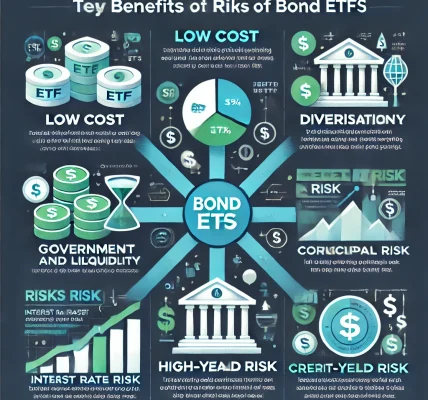When it comes to building a diversified fixed-income portfolio, municipal bonds (munis) and corporate bonds often stand out as popular choices. While both offer distinct advantages, they serve different purposes and carry unique risks. Deciding which option is right for your portfolio depends on your investment goals, risk tolerance, and tax considerations.
In this comprehensive guide, we will explore the key differences between municipal and corporate bonds, analyze their benefits and risks, and help you determine which one aligns best with your financial objectives.
📚 What Are Municipal Bonds?
Municipal bonds (munis) are debt securities issued by state and local governments, municipalities, or public agencies to finance public projects such as schools, highways, and hospitals. When you invest in a municipal bond, you are essentially lending money to a government entity, which agrees to pay you interest over a specified period and return the principal amount at maturity.
🔍 Types of Municipal Bonds:
- General Obligation (GO) Bonds: Backed by the full faith and credit of the issuing authority. They are considered safer as they rely on the issuer’s ability to levy taxes.
- Revenue Bonds: Backed by the revenue generated from the specific project being financed (e.g., toll roads or water treatment plants). These carry higher risk compared to GO bonds.
🏢 What Are Corporate Bonds?
Corporate bonds are debt instruments issued by corporations to raise capital for business operations, expansion, or refinancing. Investors who purchase corporate bonds receive regular interest payments (coupon) until the bond matures, at which point the issuer repays the principal amount.
🔍 Types of Corporate Bonds:
- Investment-Grade Bonds: Issued by companies with strong credit ratings, offering lower yields but higher safety.
- High-Yield (Junk) Bonds: Issued by companies with lower credit ratings, offering higher yields to compensate for the increased risk.
⚖️ Key Differences Between Municipal and Corporate Bonds
| Feature | Municipal Bonds | Corporate Bonds |
|---|---|---|
| Issuer | State, local governments | Private corporations |
| Tax Treatment | Often tax-exempt | Taxable |
| Risk Level | Lower risk (GO bonds) | Higher risk (depends on issuer) |
| Yield Potential | Lower yields | Higher yields |
| Purpose of Funds | Public infrastructure projects | Corporate growth and operations |
| Credit Ratings | Generally higher ratings | Varies by issuer |
| Liquidity | Moderate to high | High |
| Default Risk | Low | Moderate to high |
📈 Pros and Cons of Municipal Bonds
✅ Advantages of Municipal Bonds:
- Tax Benefits: Interest income from most municipal bonds is exempt from federal taxes and, in some cases, from state and local taxes as well. This makes them particularly attractive for investors in higher tax brackets.
- Lower Default Risk: General obligation bonds, in particular, are backed by the taxing power of the issuer, making them relatively safe.
- Stable Income: Municipal bonds provide predictable, steady income over time, making them ideal for conservative investors.
- Social Impact: Investing in munis supports essential public projects, contributing to societal development.
❗️ Disadvantages of Municipal Bonds:
- Lower Yields: Due to their tax-exempt status and low-risk nature, municipal bonds typically offer lower yields than corporate bonds.
- Interest Rate Sensitivity: Like all fixed-income securities, municipal bonds are susceptible to interest rate fluctuations, which can affect their market value.
- Limited Growth Potential: Municipal bonds may not offer the same capital appreciation opportunities as corporate bonds.
📊 Pros and Cons of Corporate Bonds
✅ Advantages of Corporate Bonds:
- Higher Yields: Corporate bonds generally offer higher interest rates than municipal bonds, compensating for the increased risk.
- Diverse Investment Options: Corporate bonds come in various maturities, credit ratings, and sectors, allowing investors to customize their portfolios.
- Potential for Capital Gains: High-yield corporate bonds or bonds from growing companies may offer opportunities for capital appreciation.
❗️ Disadvantages of Corporate Bonds:
- Taxable Income: Interest earned from corporate bonds is fully taxable, which reduces net returns, especially for investors in higher tax brackets.
- Higher Credit Risk: Corporate bonds are subject to credit risk, and the likelihood of default increases with lower-rated bonds.
- Market Volatility: Corporate bonds may be more sensitive to economic downturns and corporate performance.
📉 Risk Analysis: Municipal Bonds vs. Corporate Bonds
⚠️ 1. Default Risk
- Municipal Bonds: Default risk is minimal, particularly for GO bonds backed by the taxing authority of municipalities. However, revenue bonds may carry higher default risk.
- Corporate Bonds: The risk of default is higher for corporate bonds, especially high-yield (junk) bonds issued by companies with weaker financials.
📉 2. Interest Rate Risk
Both municipal and corporate bonds are susceptible to interest rate risk. When interest rates rise, bond prices fall, which can impact the market value of both types of bonds.
💱 3. Liquidity Risk
- Municipal Bonds: Liquidity may be lower in the municipal bond market, especially for less popular issues.
- Corporate Bonds: Corporate bonds, especially those from well-known issuers, tend to be more liquid.
🌍 4. Inflation Risk
Since both municipal and corporate bonds offer fixed interest payments, inflation can erode the purchasing power of the returns over time.
🧮 Tax Considerations: Munis vs. Corporate Bonds
📚 Municipal Bonds: Tax Benefits
- Federal Tax Exemption: Interest income from most municipal bonds is exempt from federal income tax.
- State and Local Tax Exemption: In some cases, interest income is also exempt from state and local taxes if the bond is issued within the investor’s home state.
💸 Corporate Bonds: Taxable Income
- Interest earned from corporate bonds is fully taxable at federal, state, and local levels.
- High-yield corporate bonds may provide higher returns, but the tax impact can significantly reduce net gains for high-income investors.
🧐 Who Should Invest in Municipal Bonds?
✅ Ideal for:
- High-Income Investors: Investors in high tax brackets can maximize tax savings with municipal bonds.
- Risk-Averse Investors: Those seeking lower-risk investments with predictable returns.
- Long-Term Income Seekers: Ideal for retirees looking for steady income with minimal tax implications.
⚠️ Not Ideal for:
- Investors seeking high returns or capital appreciation.
- Individuals who prioritize higher yield over tax savings.
🤑 Who Should Invest in Corporate Bonds?
✅ Ideal for:
- Yield Seekers: Investors looking for higher yields compared to government bonds.
- Moderate to High-Risk Takers: Those willing to take on higher credit risk for potentially greater returns.
- Diversification Seekers: Investors aiming to diversify their bond portfolios with corporate securities.
⚠️ Not Ideal for:
- Conservative investors who prefer low-risk, tax-efficient investments.
- Individuals seeking tax-advantaged income.
📊 Municipal Bonds vs. Corporate Bonds: Side-by-Side Comparison
| Feature | Municipal Bonds | Corporate Bonds |
|---|---|---|
| Issuer | Government entities | Private corporations |
| Risk Level | Low to moderate | Moderate to high |
| Interest Rate Risk | Moderate | Moderate |
| Yield Potential | Lower yields | Higher yields |
| Tax Treatment | Tax-exempt (federal, sometimes state/local) | Fully taxable |
| Liquidity | Moderate | High |
| Ideal for | Conservative, high-income investors | Yield-seeking, risk-tolerant investors |
| Default Risk | Low (especially for GO bonds) | Moderate to high (varies by rating) |
🎯 Factors to Consider When Choosing Between Municipal and Corporate Bonds
📚 1. Tax Efficiency
- If you are in a high tax bracket, municipal bonds may be more appealing due to their tax-free income.
- For investors in lower tax brackets, the higher yields of corporate bonds may outweigh the tax benefits of municipal bonds.
📈 2. Risk Tolerance
- Conservative investors may prefer municipal bonds due to their safety and reliability.
- Risk-tolerant investors may lean toward corporate bonds, which offer higher returns with increased credit risk.
⏳ 3. Investment Horizon
- Long-term investors seeking steady income may find municipal bonds more suitable.
- Short- to medium-term investors looking for higher yields may opt for corporate bonds.
🎨 Final Verdict: Which Option Is Right for You?
Choosing between municipal and corporate bonds depends on your investment objectives, tax considerations, and risk tolerance.
- Municipal Bonds: Ideal for high-income investors seeking tax-efficient income and low-risk stability.
- Corporate Bonds: Better suited for investors seeking higher yields and willing to accept higher risk.
For a balanced fixed-income portfolio, consider diversifying across both municipal and corporate bonds to enjoy the benefits of tax efficiency and higher returns.



